Teen entrepreneurs: 'My friend's pug inspired my business'
- Published
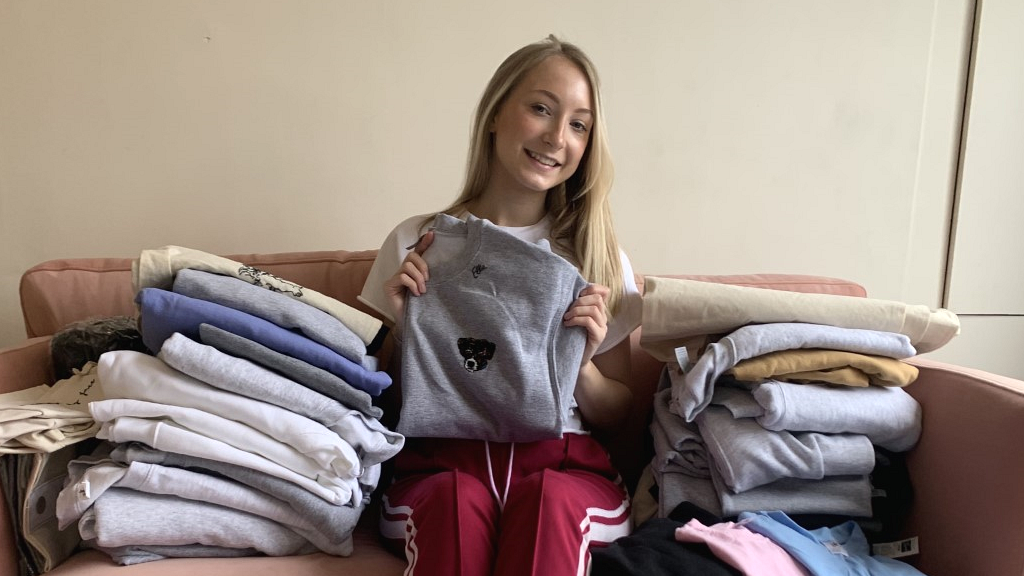
Phoebe Cosgrove started her business from her living room
As part of our CEO Secrets series, which invites business leaders to share their advice, we are focusing on start-ups that have launched during lockdown, looking at different types of entrepreneur. This week, we hear from teenagers.
The business journey of Phoebe Cosgrove began with a pug.
The 19-year-old dental nurse apprentice, who lives with her mum in Beckenham, Kent, feared for her job prospects when the first lockdown started. Then while on furlough she had an idea.
She began learning to sew, finding it a welcome distraction that was good for her mental health.
A friend asked her to stitch a cartoon picture of her beloved pug so that she could wear it as a badge of pride on her jumper.

The first dog that Phoebe was asked to stitch...
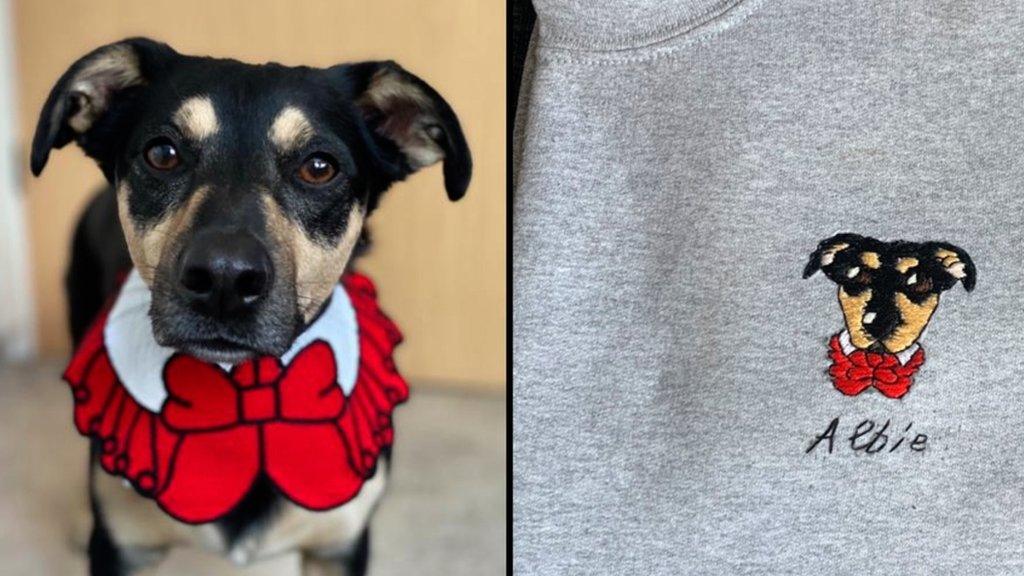
...soon led to more personalised pups
When they saw the results, all her dog-loving friends wanted one too. Then the cat-lovers joined in.
Her friends were sticking the results on their socials and all of a sudden Phoebe had more orders than she could keep up with.
So she set up a business called Pretty Paws By Phoebe.
Her living room became a production line and she set up an online shop on the craft platform Etsy. As orders came in from further afield, customers would send pictures of their pets for her to work from.
She even had a request for a sheep (she's not sure if it was a pet).
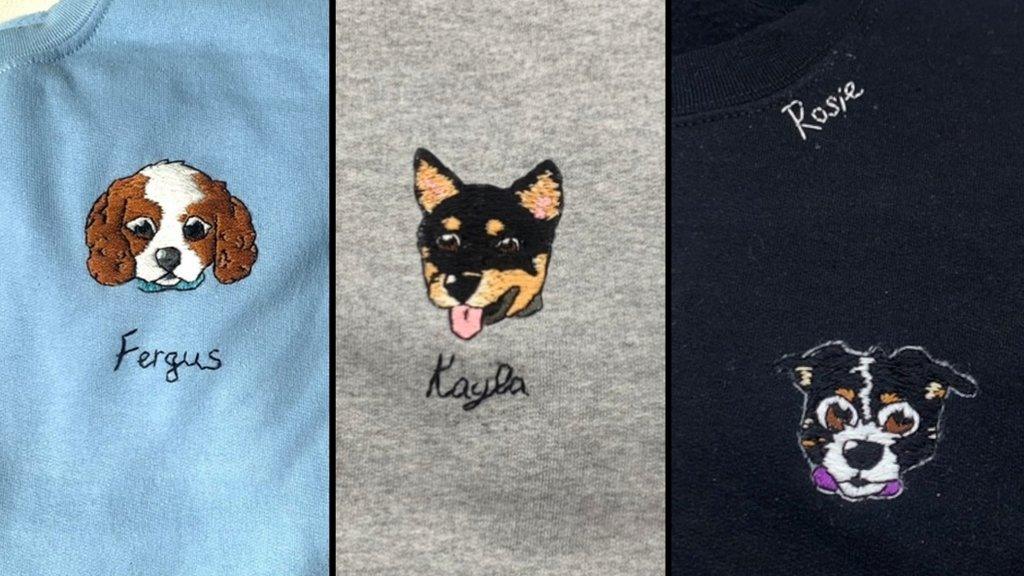
Phoebe's animal badges proved popular on Etsy
Occasionally it has gone beyond animals.
"One of my favourites was when someone wanted the signature of their loved one who had passed away, stitched over the heart," remembers Phoebe.
She also made face masks for a wedding (when they were allowed), stitching on the bride and groom's initials with the date - poignant mementos for guests.
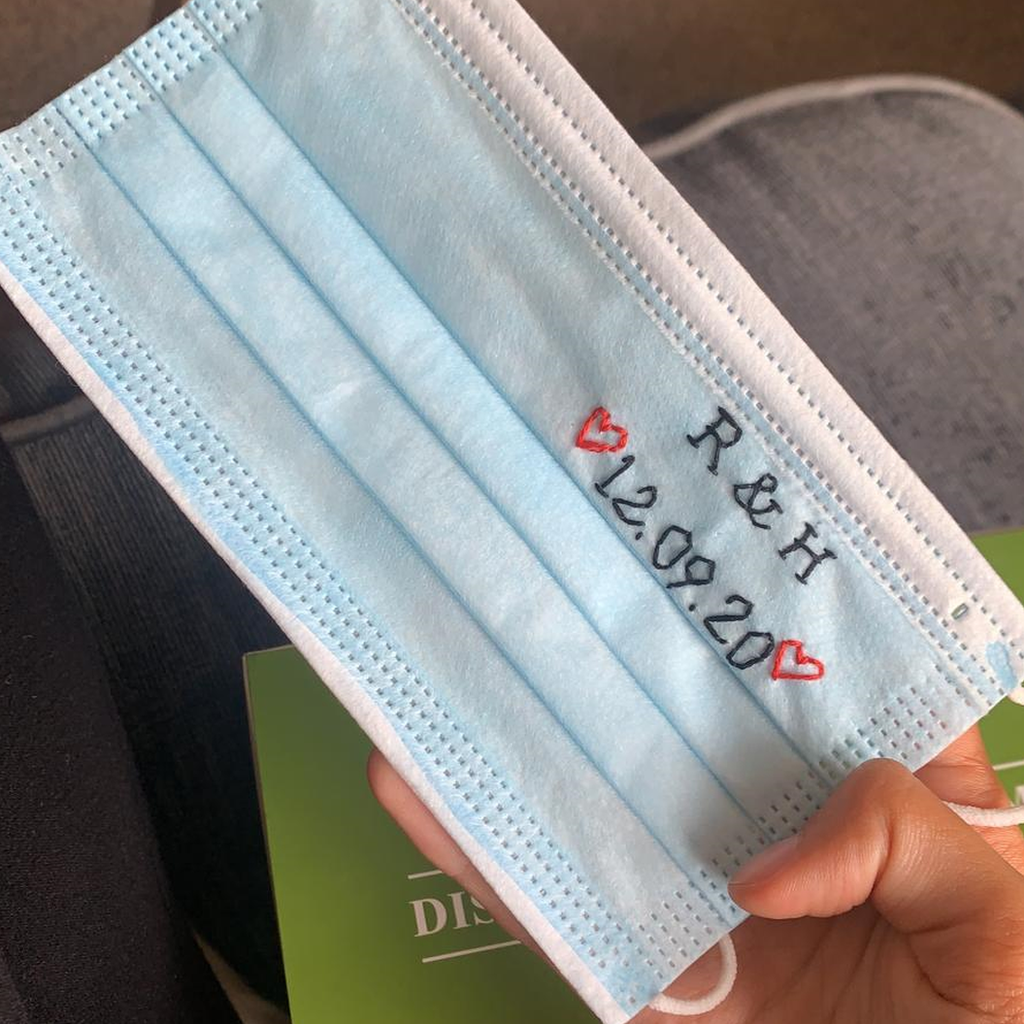
A practical and novel memento for a 2020 wedding

Being a young entrepreneur, it's second nature to her to use social media to tell her story and find customers. She shows off her techniques in TikTok videos and blogs about her business journey on YouTube.
She was on the minimum wage as a dental nurse apprentice. She now makes on average £260 a week, though she made £800 in her busiest week. She says it didn't cross her mind to investigate universal credit.
Although she never saw herself as an entrepreneur, she is determined to see if she can make this pet-themed business her future.
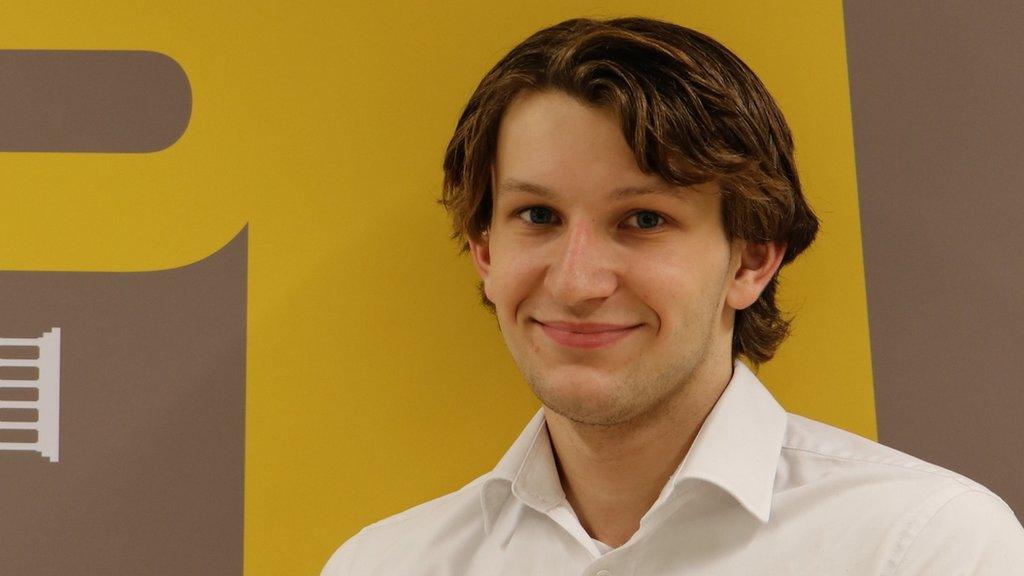
Charles Robinson put his degree on hold to start his business. He is not sure whether he will return to his studies
Nineteen-year-old student Charles Robinson had his business brainwave on his commute in London in April, while inspecting his contact lens kit.
He wondered if a cleaning container that came with the pack could be adapted for the Covid era. Hand sanitiser products were flying off the shelves at the time.
The first-year UCL philosophy student contacted the factory in Italy that made the product and began negotiations to see if the same tech could be fitted with anti-viral gel.
It turned out it could, so he ordered a "sizeable amount", even though this was something of a gamble - he didn't have anyone signed up to buy the new product yet.
The result is a "gel card" that snaps to release a single dose of hand sanitiser.
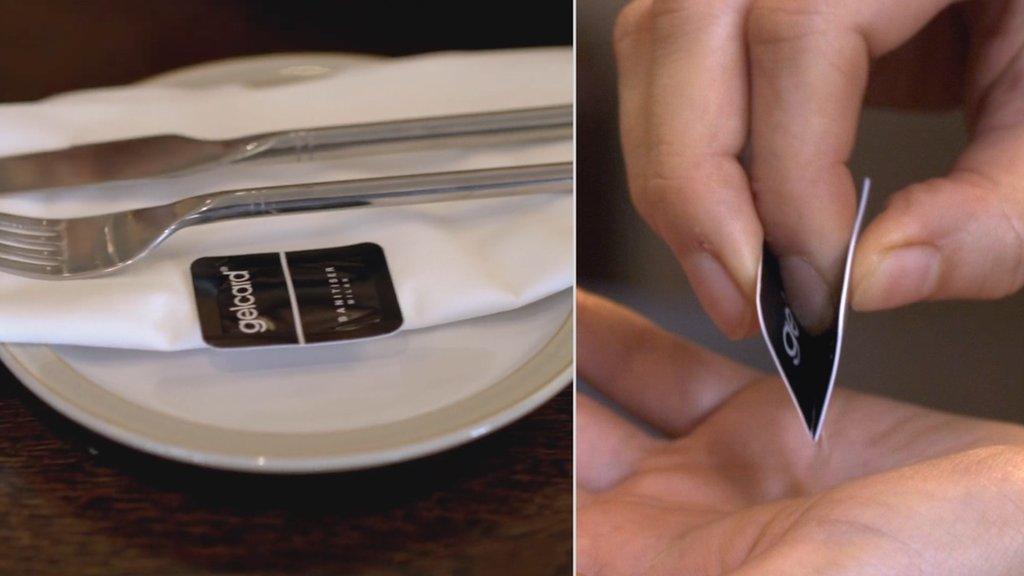
Hotels and restaurants have purchased the gel card
In less than a year, Charles and his co-founder Paul Schmitz-Gielsdorf say they have sold 900,000 cards, with sales of £155,000. Clients include large chains of hotels and restaurants (even though many are closed or under capacity due to lockdown).
The idea of using cards is that they are more efficient at releasing gel than bottle dispensers and don't generate queues of people, who should be social distancing. However, the cards are also examples of single-use plastic. Charles is currently arranging to switch production to recycled plastic.
His university's entrepreneurship hub helped him launch the business, but he's going "on leave" from his studies for two years and is not sure whether he will complete his degree.
Before the pandemic he'd always thought of himself pursuing a steady, corporate-style career.
"But now I can't imagine not running my own business and I need to focus on the opportunity I have," he says.
Charles Robinson shares his advice for young entrepreneurs
He thinks many teenage entrepreneurs lack confidence because they fear lack of experience will count against them.
But they have less to lose compared to older people, he points out, as many live at home with few overheads and financial responsibilities, and this can put them in a stronger position when it comes to taking risks.

Young entrepreneurs in the pandemic
Young people have been hit hard in the pandemic as work placements and graduate schemes dried up. Also, they tend to work in sectors like retail and hospitality, which faced some of the biggest job losses.
But there is evidence that people in their late teens and early twenties have responded by getting entrepreneurial.
Last year, 72% more 16 to 20-year-olds started a business than in 2019, according to a study by The Accountancy Partnership, which looked at people who had registered as sole traders.
And around 44% of young people think starting their own business is more attractive since the pandemic, according to a survey of 16 to 25-year-olds commissioned by the Prince's Trust.
It found that a quarter would rather work for themselves than for a company, with 62% of young people agreeing it would make them feel more in control of their future.

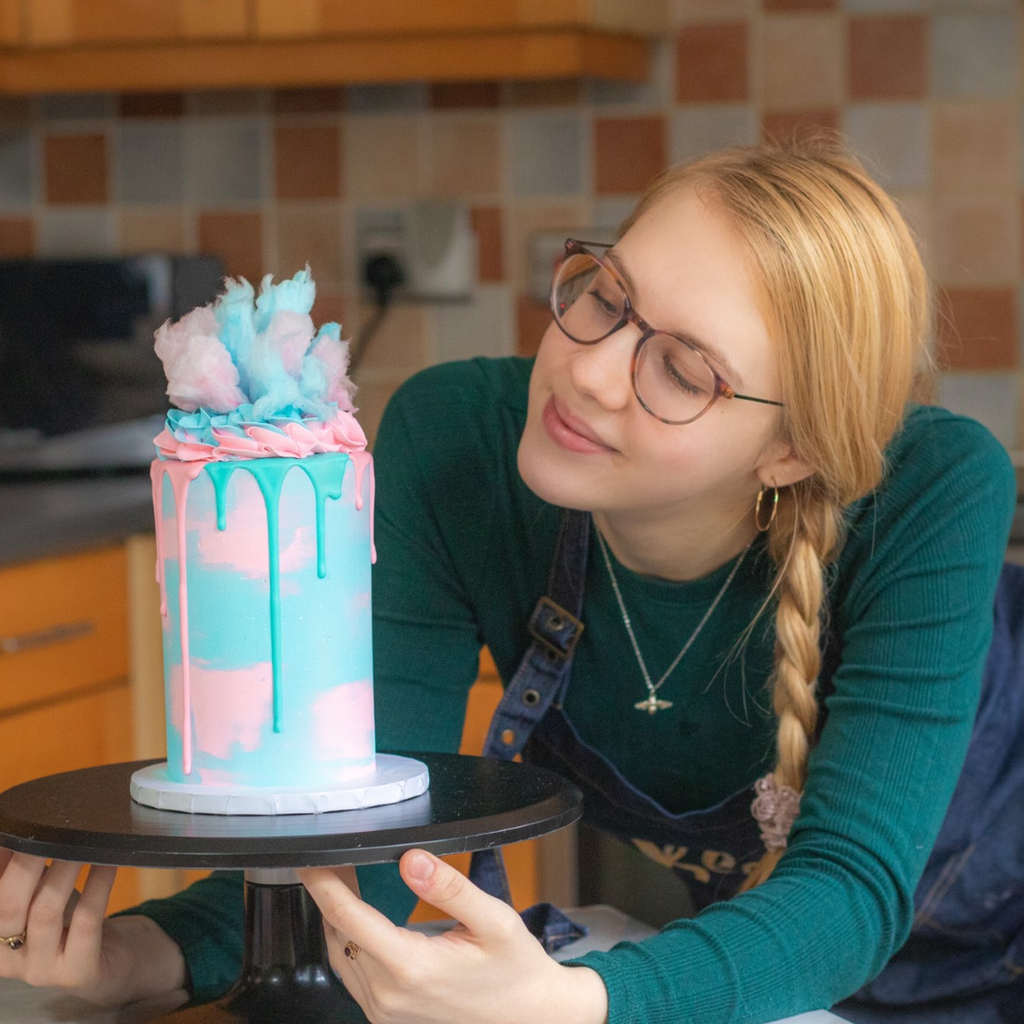
"Reluctant" entrepreneur Eloise Beesley turned her passion for baking into a business

"I never thought I could be my own boss," says Eloise Beesley, 19. "I always thought I had to be under someone else - and I was fine with that."
She now runs her own baking business in Welwyn Garden City, Hertfordshire and she too thinks she can turn it into a long-term career.
When Covid struck, her life was in limbo. She had left school after A-levels in 2019 with an apprenticeship at an HR company lined up - but it fell through at the last minute.
She struggled to find alternative opportunities and was still figuring out what to do when the first lockdown began.
Feeling desperate, she decided to take matters into her own hands and set up her own business.
"I was so reluctant," remembers Eloise. She had never seen herself as an entrepreneur. It took practical advice and encouragement from a friend who had recently set up a business to give her the push she needed.
She also found confidence by focusing on something she was passionate about: baking.
"It has been a way to relieve stress for many years," she explains.
So she registered as a food business, organised public liability insurance, built a website and Beesley's Bakes was born.
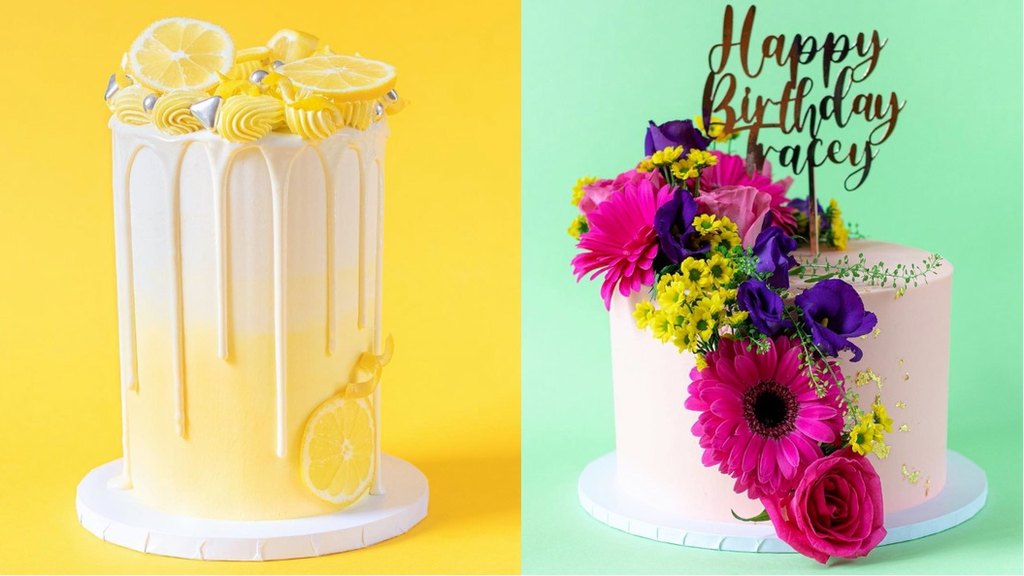
Eloise spends a lot of her time promoting her work on social media
She started baking in her boyfriend's family's kitchen and quickly built up a local following.
As demand grew in the run-up to Christmas, she even had enough orders to rent a bigger kitchen in a community hall - until it was turned into a Covid vaccine centre.
She has a steady production line of cakes and cupcakes and is also now expanding into fudge, which she can sell through shops. A lot of her time is spent promoting her work on social media, a good way to reach new customers.
In less than a year she is looking at sales approaching five figures, enough for her and her boyfriend to move into a flat together.
The best thing about being your own is boss is you can "do something you love for a living", she says.
You can follow CEO Secrets series producer Dougal on Twitter: @dougalshawbbc, external
- Published16 September 2020
